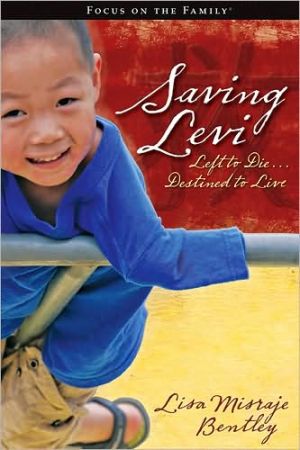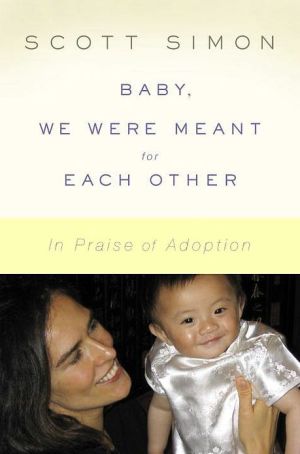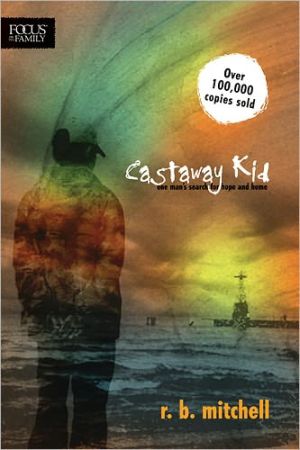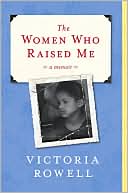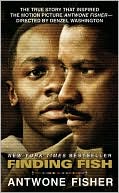Saving Levi: Left to Die ... Destined to Live
Lisa and John Bentley went to China to build an orphanage in a village near Beijing. Soon after their arrival, a 6-week-old baby boy, with burns on over 70% of his body, was found in a field and brought to them. This is just the beginning of Levi's story. Saving Levi brings together the stories of believers and non-believers alike whom God used to save the life of this little boy and help him heal. Levi's story has already united people around the world through E-mail, prayer, and word of...
Search in google:
Lisa and John Bentley went to China to build an orphanage in a village near Beijing. Soon after their arrival, a 6-week-old baby boy, with burns on over 70% of his body, was found in a field and brought to them. This is just the beginning of Levi's story. Saving Levi brings together the stories of believers and non-believers alike whom God used to save the life of this little boy and help him heal. Levi's story has already united people around the world through E-mail, prayer, and word of mouth. This is a book about the value of life and a loving God who uses whomever He pleases to accomplish His will.
Saving Levi\ Left to Die ... Destined to Live \ \ By Lisa Misraje Bentley \ Tyndale House Publishers, Inc.\ Copyright © 2007 Lisa Misraje Bentley\ All right reserved.\ ISBN: 1-58997-449-2 \ \ \ Chapter One\ Left to Die\ "The kingdom of heaven is like treasure hidden in a field." -Matthew 13:44\ * * *\ It would be 24 hours from the time Levi was left to die in the field until I first saw him.\ That March, like all Marches, came damp and dreary to Northern China. That morning was no exception. As another gray day awakened, a baby's cries pierced the drizzly dawn in a village on the outskirts of the city of Langfang.\ One by one, villagers heard the wail, a sound like a wounded animal begging to be put out of its misery. But it wasn't a cat or a fox. Drawn toward the persistent, shrill cries, a peasant farmer wandered farther into the fallow cornfield where he found a baby.\ Word spread that a child had been abandoned in a nearby field. Within the hour at least 40 villagers came to see. All of them stared in shock as they encircled the baby.\ Before them lay an infant, no more than six weeks old, crying in agony. He was wrapped in crimson silk and dressed in a once-beautiful, bright yellow outfit-now soaked through with body fluids and blood. This baby's face had been severely burned; he didn't have long to live.\ Aghast at the baby's condition, the villagers stood paralyzed, unable to respond. Should they pick himup? Should they take him to the hospital? Who was willing to take on this burden? What future would this child possibly have?\ Child abandonment in China is a double-edged sword. Because of their child's critical burns, this baby's parents probably felt they had no choice but to leave him in a field where he would either die peacefully or be rescued. And yet if they were caught abandoning their baby, they would receive a strict punishment-a heavy fine and possible prison time. Already poor, they would never be able to pay the financial price. And jail time would mean losing the means to support the rest of their family. Instead, they would live the rest of their days with the memory of abandoning their baby.\ The villagers knew there could be a price to pay for getting involved. They knew they would have to answer the authorities' questions: Why do you have this child in your possession? Who was responsible for his injuries? Who are the parents? Are you protecting them? How will you pay for his medical treatment?\ No one in this poor little village had money to help. They had families of their own-too many mouths to feed already. What point would there be in taking in one more, especially one who looked ready to cross the threshold of death's door? Who was willing to risk complicating his life for that of a severely burned infant? After all, he probably wouldn't live until morning anyway.\ For two full hours, the ring of villagers remained, talking in hushed voices about what to do, scrutinizing with curiosity the infant's burns. Gradually, the villagers began to shuffle away. Though they felt sad for the infant, his case seemed futile. What good would it do to help this dying baby?\ The sky had lightened, signaling time for the village farmers to head to work. The baby's cries continued, disturbing the morning and the memories of those who had just seen him.\ One by one, the villagers had left. All except for one man-Mr. Wang. Fiftyish, dark-skinned, and taller than most Chinese men, he shifted from foot to foot, wondering what he should do. There lay a baby, cold, afraid, and in excruciating pain. Mr. Wang took pity on him. With grown children of his own and a young grandchild living in his home, he could not bring himself to leave the child to die. As if begging for Mr. Wang to make a decision, the baby's shrieks took on a more desperate pitch in the desolation of the field.\ Alone now, Mr. Wang moved close enough to notice that the baby's head had been shaved and a bandage still remained where an IV had been inserted. Someone had already brought this baby to a village clinic. In China, they often give babies medicine through an IV in the scalp. The baby's parents probably brought him to the farm doctor after the terrible accident. Mr. Wang tried to imagine what might have happened the night before. Maybe the electricity had gone out again, like it often does in the villages. Maybe the family had been working outside and placed a candle too close to the crib. Perhaps it fell over and started the bedding on fire. When the parents brought him to the farm doctor, he probably said, "Save what little money you have. This child will die soon."\ Mr. Wang could only imagine the pain this baby's parents must have felt when faced with the excruciating decision to let their son go. With children of his own, he couldn't envision having to wrap a child in burial clothes and leave him in a field to die.\ I can save this baby. I will raise him as my own child.\ Before he realized what he was doing, Mr. Wang stooped down and gently scooped the baby from the ground. He rocked the baby back and forth, pressing him against his chest so that he could hear his heartbeat. The rhythmic sound of compassion stilled the infant, now quiet for the first time that morning.\ What now? What do I do with this dying baby? Filled with resolve and fear at the same time, he mounted his bicycle and, with one hand on the bar and one arm supporting the baby, he pedaled as quickly as he could to his home where his wife would be waiting to hear what all the stir was about in the field. How will I explain all of this to her? What will she say when I show her the baby?\ When Mr. Wang reached his cement-block house, he came to a smooth stop, being careful not to jostle the baby. He gingerly swung his leg around and dismounted the bike, putting as little pressure against the baby's body as possible. Hesitantly, he approached the front door. "What happened?" his wife asked. Suddenly, she noticed the bundle he was holding.\ "Let's go inside," he said. Gently, he laid the baby on the only bed in their one room, cement-floor house.\ "Oh, no!" she gasped. Her hands flew up to cover her mouth, and horror blanketed her face. Mr. Wang tried to explain how and where he had discovered the child, but the baby's sudden wails made it impossible to talk. While he rocked the baby, his wife searched frantically for a bottle. Finding neither a bottle nor milk, Mr. Wang placed the baby in his wife's arms and pedaled off on his well-worn bike to the village store, which was just minutes from their house and tucked down an alleyway. This store was a shack where the locals bought essential items like tea and powdered baby milk. Mr. Wang quickly paid for these items and sped back home.\ The baby was screaming full force by now. Nothing Mrs. Wang did would calm him. Quickly, Mr. Wang mixed the powdered formula with water. At the first sip of milk, relief washed over the baby. He sucked the bottle dry in what seemed like one giant slurp. Mr. Wang quickly mixed another bottle, and again the baby emptied the bottle in seconds.\ Satisfied from the warm milk, the baby quieted down enough for Mr. Wang to lay him out on the bed again. As delicately as he could, he pulled back the outer crimson blanket. Next, he carefully began opening up the yellow silk burial outfit, which was now sticking to his skin from the blood and body fluids that continued to seep from his wounds. When he opened the infant's clothes to examine the burns, he recoiled, nearly stumbling backward into the little table in the middle of the room. This was not a baby. Mr. Wang had never seen anything like it. The baby's face was burned along his jaw line, his skin melted from one ear down around the chin to the other ear, including the areas around his mouth. His entire left side was seared, leaving the muscles and tissue along his torso exposed. Flames had singed away all of the skin from his left shoulder down to his hip. His left arm was so charred that when he tried to lift it up, ashes fell from it. His little hand had already turned black, as had his knee.\ Inside the baby's blanket, Mr. Wang discovered ten RMB (or renminbi, the equivalent of approximately U.S.$1.25). The parents must have spent all they could afford with the farm doctor, tucking what was left over into his blanket to pay for his passage into the next life.\ But he's not dead! Mr. Wang wanted to shout. Did the parents know someone would find him in that field? What were they expecting? How can I help this dying baby?\ Seeing the severity of the baby's open wounds, Mr. Wang realized immediately he would not be able to simply love this baby back to health. In fact, with each minute that passed, the child's wounds worsened and his strength ebbed.\ Desperate for help, Mr. Wang, again cradling the baby in one arm, biked down to the village leader's house. It was still early in the morning as Mr. Wang explained how he had found the baby. Then he begged the leader, "Can you help him?"\ Stunned at the state of the child swaddled against Mr. Wang's chest, the leader struggled to find words. Shaking his head in hopelessness, he said, "There is nothing I can do to help this baby." Seeing Mr. Wang's despair, he tried to offer a rational perspective: "If a horse breaks a leg, we would put it out of its misery. In this baby's grave condition, we probably need to take the same view and let nature take its course."\ Mr. Wang refused to accept this. He got back on his bicycle, now in a race against time. He had only one option left.\ Undeterred by the village leader's inability to help the baby, Mr. Wang pedaled several miles to the Langfang Civil Affairs Ministry. Knowing this government agency would find the baby within the hour, he wrapped the infant in his crimson blanket and gingerly placed him on the front steps of the newly constructed glass and cement ministry building. The stark contrast between the baby's disfigured appearance and the polished facade of the building highlighted the disparity of life in China. On the one hand, Langfang, the larger city surrounding Mr. Wang's village, was bustling with development. Cranes perched atop the roofs of newly erected high-rise buildings. And yet, even in the midst of all this modernization, Mr. Wang still rode his bicycle to work every day, like hundreds of others. Too poor to afford a car, he pedaled back and forth to the fields where he labored each day.\ Today, though, was not an ordinary workday. This would be a day he would never forget. Gently patting the crying infant, Mr. Wang tried to reassure him before saying good-bye. Is this how his parents felt before they left him? Mr. Wang knew he was this child's only friend, and now he, too, would be abandoning him. With fear and sadness, he mounted his bicycle. As he began riding away, he took one last look at the baby lying alone on the cement steps. Pedaling as if he were trying to ride away from a nightmare, he breathed the only prayer left, "Please, save him."\ * * *\ My family had been in China only a few weeks when we heard about this severely injured child. We had come to China to work at a small and struggling orphanage in Langfang. The city of Langfang is a perfect microcosm of the evolution taking place in China. Over half a million people live in this city, which is undergoing incredible expansion. Basic infrastructure improvements are being made on a large scale.\ Like an expectant host getting ready to throw a big party, Langfang is constantly abuzz with preparations. Construction projects dot the city. Their new, expansive four-lane boulevards divided by ornate flower gardens and larger-than-life outdoor sculptures make you feel as if you might have arrived at the party too soon, though. While there's a lot of hustle and bustle, the dichotomy between sharing traffic lanes with cars, bikes, rigged-up motor scooters with two or three passengers, and shepherds and their bleating flocks of sheep makes the perfectly paved roads seem, well, like too much, too soon. It's as if China is way in front of the growth curve in some ways, and yet preposterously behind the times in others.\ On these same magnificent new thoroughfares, for instance, they still hire elderly peasants to sweep the streets-by hand with brooms made of horsehair or stiff, leafy bristles of some kind. And the gardens are planted and maintained by peasant farmers who ride their bikes to whatever plot they've been assigned to that day and park them in the middle of the road.\ This same dichotomy of the ancient struggling to become modern existed in the home we were renting. My husband, John, had picked out a house for us to rent before I arrived in China with the kids. He had told me how wonderful it was. It was near the home of our orphanage teammates, Tim and Pam Baker. The picture he had painted and the reality of the house were quite different. On the outside, with its cement block styling and contemporary lines, it looked somewhat twenty-first century. And yet inside, we had no heat. Having arrived in November, we had to wear two layers of clothing at all times. For all of its modern design, none of the toilets had been updated. No matter how hard I tried, I just could not get used to the squat pot toilets-holes cut in the floor where you simply crouch down, take aim, and hope for the best.\ The rats, which made their presence known by scampering up and down the inside of the walls, were taking their toll on all of us. I suppose I should have been grateful they stayed on the inside and didn't venture out where we could see them. But hearing them jumping around inside the walls and multiplying day by day put all of us on edge.\ Within only one hour of moving into that house, I knew I wanted to move out. However, we liked the neighborhood where we lived. It was a gated community with about 100 homes, which we had dubbed the Langfang Children's Village. This is where the first two foster homes had been opened, and more were in the works. Unfortunately, one man owned most of the homes in the neighborhood, so few were available to purchase. After almost giving up hope, we were thankful to stumble onto one that was available. It was spacious and more westernized-the toilets were above ground. A little garden decorated the backyard, making it feel homier. We had put an offer on the home earlier that day, which the Canadian owners accepted. We were elated at the prospect of moving out of the heatless house of multiplying rats. We had gone over to Tim and Pam's to celebrate and had just sat down to watch an action movie when the phone rang.\ Tim answered it in the next room, and I overheard him talking to Mark Wei. Mark was Tim's right-hand man. They had met each other while working together for the Christian Broadcasting Network (CBN) in China. When Tim decided to leave his post as director of CBN China to pursue full-time orphan-relief work, Mark followed him. As a Chinese national, Mark knows the ins and outs of dealing with government agencies and is adept at forging warm relationships with people in key positions throughout China. Although Mark is a man of few words, he is a hard worker. Despite our blue-jeans-and T-shirt dress code at work, Mark always dressed in slacks, a shirt and tie, and dress shoes-ready to put in a serious day of work.\ Mark speaks excellent English and understands the nuances of Chinese culture. When we would make mistakes in our interactions with the Chinese, Mark would make everything right again. Mark and John became friends quickly and worked side by side to develop relationships throughout China, which, on this particular night, would prove to be life saving.\ "Mr. Yan says the Langfang Orphanage has a severely burned baby," Mark told Tim. "Someone from the Langfang Civil Affairs Ministry found him on the front steps this morning. The baby doesn't look like he'll make it. Do you think we can try to help?"\ "Yes, of course we will help," Tim responded. "We'll be right over to pick up the baby." Mark had been key in establishing a relationship with Mr. Yan, the director of the Langfang Orphanage, whom we had met earlier when we took in two at-risk babies. Mr. Yan knew he could count on us to give his special-needs babies the help they required. John and Tim began putting on their coats for the journey to the Langfang Orphanage. Before the two could make it out the door, the phone rang a second time.\ (Continues...)\ \ \ \ \ Excerpted from Saving Levi by Lisa Misraje Bentley Copyright © 2007 by Lisa Misraje Bentley. Excerpted by permission.\ All rights reserved. No part of this excerpt may be reproduced or reprinted without permission in writing from the publisher.\ Excerpts are provided by Dial-A-Book Inc. solely for the personal use of visitors to this web site. \ \
